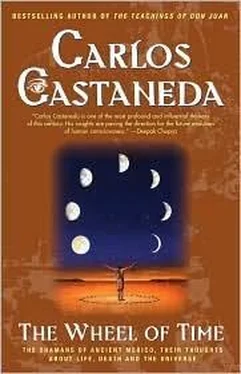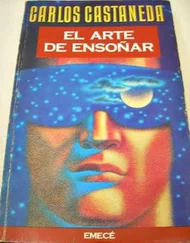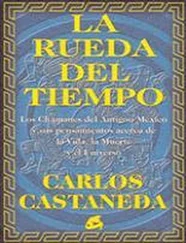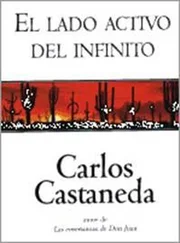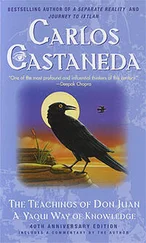Human beings are perceivers, but the world that they perceive is an illusion: an illusion created by the description that was told to them from the moment they were born.
So in essence, the world that their reason wants to sustain is the world created by a description and its dogmatic and inviolable rules, which their reason learns to accept and defend.
The concealed advantage of luminous beings is that they have something which is never used: intent. The maneuver of shamans is the same as the maneuver of the average man. Both have a description of the world. The average man upholds it with his reason; the shaman upholds it with his intent. Both descriptions have their rules; but the advantage of the shaman is that intent is more engulfing than reason.
Only as a warrior can one withstand the path of knowledge. A warrior cannot complain or regret anything. His life is an endless challenge, and challenges cannot possibly be good or bad. Challenges are simply challenges.
The basic difference between an ordinary man and a warrior is that a warrior takes everything as a challenge, while an ordinary man takes everything as a blessing or as a curse.
The trump card of the warrior is that he believes without believing. But obviously a warrior can't just say he believes and let it go at that. That would be too easy. To just believe without any exertion would exonerate him from examining his situation. A warrior, whenever he has to involve himself with believing, does it as a choice. A warrior doesn't believe, a warrior has to believe.
Death is the indispensable ingredient in having to believe. Without the awareness of death, everything is ordinary, trivial. It is only because death is stalking him that a warrior has to believe that the world is an unfathomable mystery. Having to believe in such a fashion is the warrior's expression of his innermost predilection.
Power always makes a cubic centimeter of chance available to a warrior. The warrior's art is to be perennially fluid in order to pluck it.
The average man is aware of everything only when he thinks he should be; the condition of a warrior, however, is to be aware of everything at all times.
The totality of ourselves is a very mysterious affair. We need only a very small portion of it to fulfill the most complex tasks of life. Yet when we die, we die with the totality of ourselves.
A rule of thumb for a warrior is that he makes his decisions so carefully that nothing that may happen as a result of them can surprise him, much less drain his power.
When a warrior makes the decision to take action, he should be prepared to die. If he is prepared to die, there shouldn't be any pitfalls, any unwelcome surprises, any unnecessary acts. Everything should gently fall into place because he is expecting nothing.
A warrior, as a teacher, must first of all teach about the possibility of acting without believing, without expecting rewards – acting just for the hell of it. His success as a teacher depends on how well and how harmoniously he guides his wards in this specific respect.
In order to help his ward to erase personal history, the warrior as a teacher teaches three techniques: losing self-importance, assuming responsibility for one's acts, and using death as an adviser. Without the beneficial effect of these three techniques, erasing personal history would involve being shifty, evasive and unnecessarily dubious about oneself and one's actions.
There is no way to get rid of self-pity for good; it has a definite place and character in our lives, a definite facade which is recognizable. Thus, every time the occasion arises, the facade of self-pity becomes active. It has a history. But if one changes the facade, one shifts its place of prominence.
One changes facades by shifting the component elements of the facade itself. Self-pity is useful to the user because he feels important and deserving of better conditions, better treatment, or because he is unwilling to assume responsibility for the acts that brought him to the state that elicited self-pity.
Changing the facade of self-pity means only that one has assigned a secondary place to a formerly important element. Self-pity is still a prominent feature; but it has now taken a position in the background, in the same fashion that the idea of one's impending death, the idea of a warrior's humbleness, or the idea of responsibility for one's acts were all in the background at one time for a warrior, without ever being used until the moment he became a warrior.
A warrior acknowledges his pain but he doesn't indulge in it. The mood of the warrior who enters into the unknown is not one of sadness; on the contrary, he's joyful because he feels humbled by his great fortune, confident that his spirit is impeccable, and above all, fully aware of his efficiency. A warrior's joyfulness comes from having accepted his fate, and from having truthfully assessed what lies ahead of him.
Tales of Power is the mark of my ultimate downfall. At the time that the events narrated in that book took place, I suffered a profound emotional upheaval, a warrior's breakdown. Don Juan Matus left this world, and left his four apprentices in it. Each of those apprentices was approached personally by don Juan, and assigned a specific task. I considered the task given to me to be a placebo that had no significance whatsoever in comparison to the loss.
Not to see don Juan anymore could not be soothed by pseudo-tasks. My first plea with don Juan was, naturally, to tell him that I wanted to go with him.
"You are not ready, yet," he said. "Let's be realistic."
"But I could make myself ready in the blink of an eye," I assured him.
"I don't doubt that. You'll be ready, but not for me. I demand perfect efficiency. I demand an impeccable intent, an impeccable discipline. You don't have that yet. You will, you're coming to it, but you're not there yet.
"You have the power to take me, don Juan. Raw and imperfect."
"I suppose I do, but I won't, because it would be a shameful waste for you. You stand to lose everything, take my word. Don't insist. Insisting is not in the realm of warriors."
That statement was sufficient to stop me. Internally, however, I yearned to go with him, to venture beyond the boundaries of everything that I knew as normal and real.
When the moment came in which don Juan actually left the world, he turned into some colored, vaporous luminosity. He was pure energy, flowing freely in the universe. My sensation of loss was so immense at that moment that I wanted to die. I disregarded everything don Juan had said, and without any hesitation, I proceeded to throw myself off a precipice. I reasoned that if I did that, in death, don Juan would have been obliged to take me with him, and save whatever bit of awareness was left in me.
But for reasons that are inexplicable, whether I view it from the premises of my normal cognition, or from the cognition of the shamans' world, I didn't die. I was left alone in the world of everyday life, while my three cohorts to myself, something which made my loneliness more poignant than ever.
I saw myself as an agent provocateur, a spy of sorts, that don Juan had left behind for some obscure reasons. The quotations drawn from the corpus of Tales of Power show the unknown quality of the world, not the world of shamans, but the world of everyday life, which, according to don Juan, is as mysterious and rich as anything can be. All we need to pluck the wonders of this world of everyday life is enough detachment. But more than detachment, we need enough affection and abandon.
"A warrior must love this world," don Juan had warned me, "in order for this world that seems so commonplace to open up and show its wonders."
We were, at the time that he voiced this statement, in the desert of Sonora.
Читать дальше
